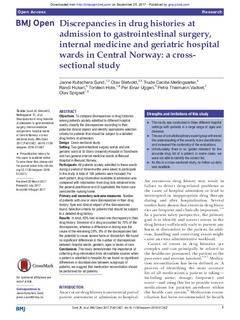Discrepancies in drug histories at admission to gastrointestinal surgery, internal medicine and geriatric hospital wards in Central Norway: A cross-sectional study
Sund, Janne Kutschera; Sletvold, Olav; Mellingsæter, Trude Cecilie; Hukari, Randi; Hole, Torstein; Uggen, Per Einar; Vadset, Petra Thiemann; Spigset, Olav
Journal article, Peer reviewed
Published version
Date
2017Metadata
Show full item recordCollections
Original version
10.1136/bmjopen-2016-013427Abstract
Objectives To compare discrepancies in drug histories among patients acutely admitted to different hospital wards, classify the discrepancies according to their potential clinical impact and identify appropriate selection criteria for patients that should be subject to a detailed drug history at admission.
Design Cross-sectional study.
Setting Two gastrointestinal surgery wards and one geriatric ward at St Olav’s University Hospital in Trondheim and two general internal medicine wards at Ålesund Hospital in Ålesund, Norway.
Participants All patients acutely admitted to these wards during a period of three months were asked to participate in the study. A total of 168 patients were included. For each patient, drug information available at admission was compared with information from drug lists obtained from the general practitioner and (if applicable) the home care services/the nursing home.
Primary and secondary outcome measures Number of patients with one or more discrepancies in their drug history. Type and clinical impact of the discrepancies found. Selection criteria for patients that should be subject to a detailed drug history.
Results In total, 83% had at least one discrepancy in their drug history. Omission of a drug accounted for 72% of the discrepancies, whereas a difference in dosing was the cause of the remaining 28%. 9% of the discrepancies had the potential to cause severe harm or discomfort. We found no significant differences in the number of discrepancies between hospital wards, genders, ages or levels of care.
Conclusions This study demonstrates the importance of collecting drug information from all available sources when a patient is admitted to hospital. As we found no significant differences in discrepancies between subgroups of patients, we suggest that medication reconciliation should be performed for all patients.

